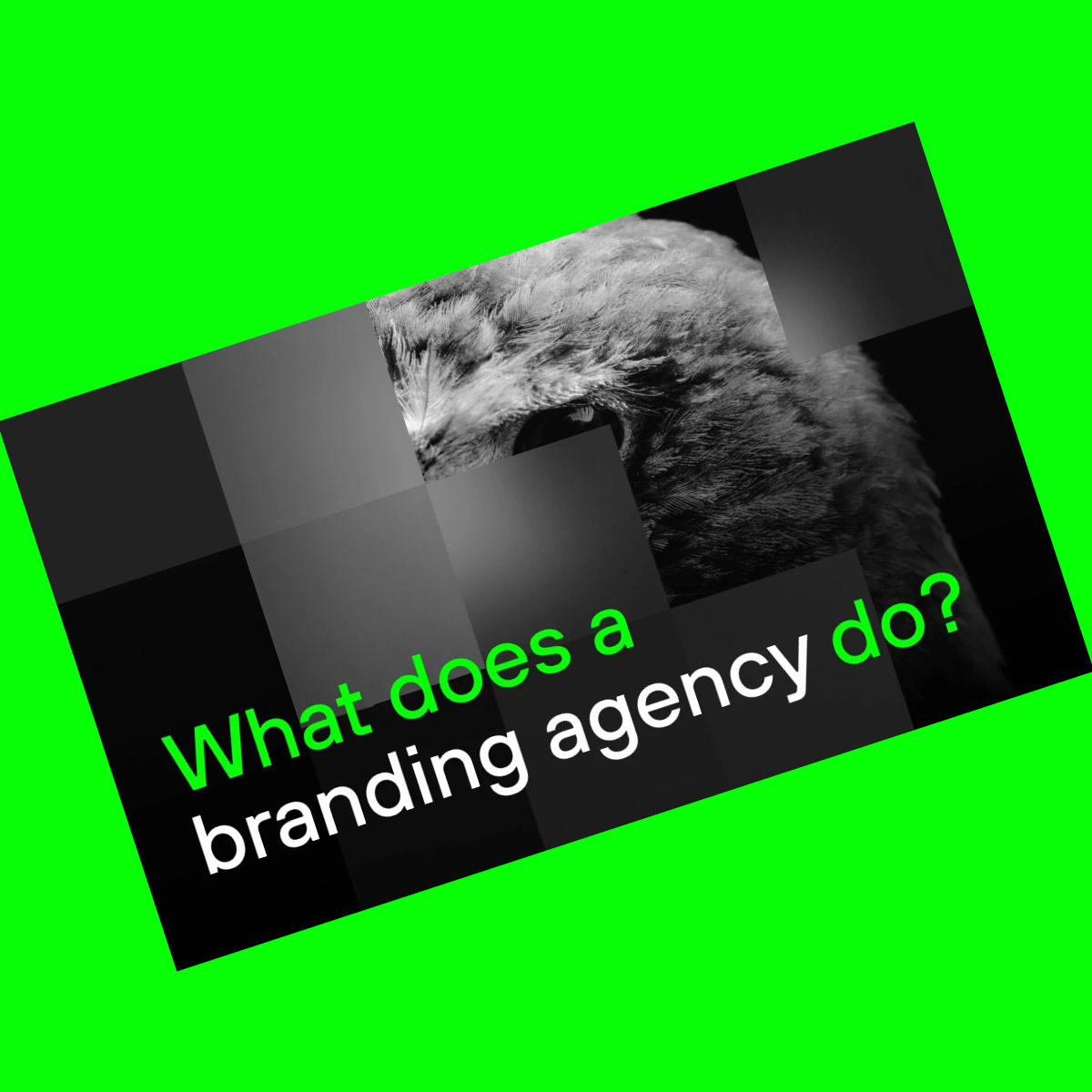What Does A Branding Agency Do? We Reveal All

What Does A Branding Agency Do? We Reveal All
Index
What does a branding agency do? It’s a fair question, with a detailed answer.
Defining a Brand Identity
If you check out the Wikipedia entry on the subject, a branding agency is simply a firm that specialises in creating and launching brands, as well as re-branding.
“The role of a branding agency is to create, plan, measure, and manage branding strategies for clients, including support in advertising and other forms of promotion,” explain our Wiki friends.
So far, so obvious.
But in a world where new businesses are popping up almost daily and the digital economy continues to evolve at a rapid rate, it seems just as reasonable to ask: “what does a branding agency do in the current digital landscape?”
The answer is: quite a lot.
For a new business entering the marketplace – one with no existing brand legacy or broad awareness of its products – the first thing a branding agency should do is help create and define a brand identity.
How exactly does it do that?
Well, firstly by working with you to establish your brand story. Your reason for being… if you will.
Everyone loves a good brand story. That’s why so many consumers demonstrate brand loyalty to huge multinational corporations like Nike and Apple.
They may turn over billions of dollars in revenue across the globe each year, but they started as a dream to design cheaper running shoes, or by building a prototype computer in a garage – not by focusing exclusively on brand strategy development or speaking to their target audience.
However, you can’t begin to define a strong brand identity and start writing your brand story without some form of collaboration. To do that, a branding agency often starts the journey with a ‘Why’ session – which is essentially a meeting between client and agency in which the underlying tone of voice and key persona of the business are agreed upon.
This is a vital part of the branding process because without it, a branding agency can’t communicate exactly what sort of company you are – from your values, to your visual identity, to what sets you apart in the marketplace. This is where you can also start the discussion around creating brand guidelines.
Subsequent sessions can help nail down brand concepts and the kind of marketing materials your company will make use of going forward, but it’s this original ‘Why’ session that plays a crucial role in defining a brand identity and helping to establish your brand personality.

Crafting a Brand Strategy
Once a branding agency has helped define your brand image, they will then often help set out some form of brand strategy.
This can range from an informal chat about how you wish your brand positioning to reflect your business in the marketplace, to a full-blown strategic plan that clearly sets out what sort of marketing collateral to produce, for which channels, and when exactly to share it to reach your target audience.
A well-defined strategy should help your brand stand out in the marketplace, even if you’re operating in a crowded field. To do that, some branding agencies will conduct market research and competitor analysis to better understand the market you’re operating in and distinguish you from your competitors.
A well-crafted brand strategy will also ensure that all marketing, brand messaging, and communication efforts are aligned and work cohesively to reinforce the brand’s tone of voice and company values.

Creating a Visual Identity
The Nike swoosh. The Coca Cola font. McDonald’s arches.
There’s a reason these are some of the most recognisable visual elements in the world.
Creating a brand’s visual identity is one of the most important elements of what a branding agency does, which is why graphic designers and those who craft a brand’s visual identity are held in such high regard – and are sometimes in short supply.
That visual identity goes far beyond a simple logo. Creating one that sticks in the mind of consumers and helps drive conversion and win new business involves the full spectrum of visual design: from logos to websites, brochures and other marketing materials, to animation and videos.
Think of your visual identity as the first thing a consumer sees. It needs to be memorable and consistent across all channels to help build a recognisable and strong brand identity, as well as to help tell your brand story and ensure your brand positioning is getting noticed and reaching your target audience.
Understanding the Digital Landscape
Where once it was possible to take out a newspaper ad to announce your business to the world, today most brand awareness is developed online.
That means a branding agency needs to be up to date with the latest brand strategies and market research, and aware of what competitors are doing in the online space – including across social media.
From taking note of viral videos trending on social media platforms like TikTok, to keeping up to date with the latest in cutting-edge website design and brand messaging, building an online brand identity that cuts through requires a deep understanding of digital marketing trends and consumer behaviour and an ability to drive brand development that ultimately converts.
Choosing When to Re-Brand
While no one ever starts a business just to overhaul the whole thing at some point down the track, there are times when re-branding simply becomes a necessity.
Sometimes that’s because your brand positioning or visual identity needs tweaking, or because your branding strategy is not having the desired impact in the marketplace, and sometimes it’s an act of crisis management or simply the chance to start afresh.
For established businesses whose branding has been in market for a long period of time, a branding agency can help create more up-to-date branding that clearly defines your unique value proposition in line with the latest trends. Sometimes that involves making changes to things like logos and websites, while other times it involves a total overhaul of every element of a company’s branding and business strategy to better align with your target audience.
While there’s no hard and fast rule on when a business should re-brand, a branding agency can help advise on what steps to take when your branding just isn’t getting noticed in the marketplace.

What Does a Branding Agency Do? A Lot!
While a dedicated branding agency spends all of its time focusing on nothing but branding, Hunt & Hawk’s in-house team of sales experts, copywriters and content creators, graphic designers, and marketing strategists do so much more than that.
We not only provide expert branding strategies that help get businesses noticed in an ever-evolving digital landscape, but we also execute the marketing campaigns and sales support to make that happen and speak directly to your target audience.
From logo design to website builds and superbly-crafted written content, Hunt & Hawk is much more than just another branding agency.
In short, we know how to get brands noticed and drive results.
If you need help with any element of your branding, drop us a line and let’s talk.
We know how to build businesses from the brand up.
FAQs
What Is the Difference Between a Marketing Agency and a Branding Agency?
Think of it this way: you can’t do marketing without your branding and brand messaging existing first. While branding agencies are often involved in a range of branding services designed to build businesses from the ground up, a marketing agency is often engaged to help with advertising and marketing campaigns once a brand has been established.
What Problem Does a Branding Agency Solve?
See above. If you’re worried your various brand elements are not in sync, a brand audit performed by the right branding agency can help align your brand guidelines and ensure your branding efforts and things like your social media marketing are not going to waste.
Many branding agencies have long advised that building a consistent brand identity starts with following the five Cs – Clarity, Consistency, Creativity, Customer-Centric, Coherence.
While there are variations on this theme, these are five of the most common traits many branding companies will suggest successful brands follow.